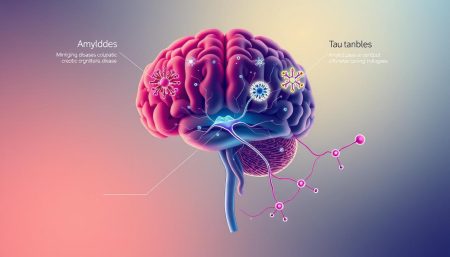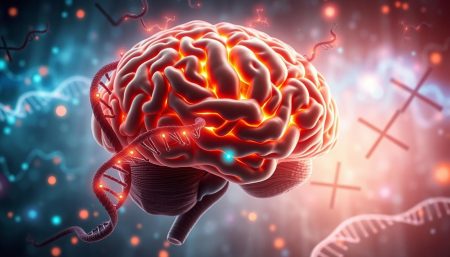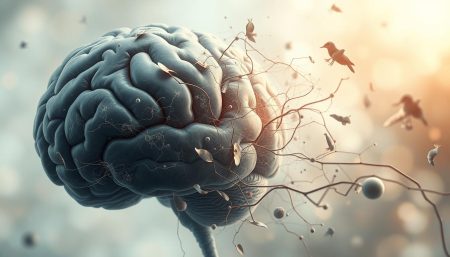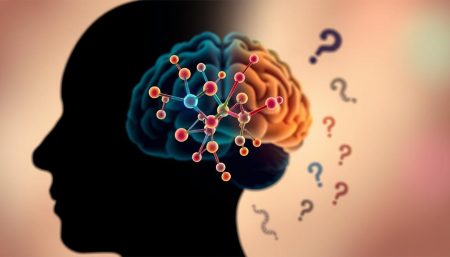Let’s start by understanding the difference between dementia and Alzheimer’s. This isn’t just about words. For families and patients, knowing the difference matters a lot. Dementia is a broad term for cognitive decline. Alzheimer’s is a specific disease that affects memory and function.
Getting to know Alzheimer’s and dementia means using the right words. It’s like understanding a category and its members. Alzheimer’s is a type of dementia. We’ll explore this further, making sure the information touches your heart as well as your mind.
Key Takeaways
- Demystifying the complex relationship between dementia vs Alzheimer’s.
- Dementia serves as the general term, encompassing a range of cognitive decline conditions, including Alzheimer’s disease.
- Alzheimer’s disease stands out as a specific type under the dementia umbrella, with its own unique impact and progression.
- Clarity in terminology is vital for proper diagnosis and care for those impacted by these cognitive disorders.
- Empathetic storytelling and accessible information can bridge the gap between medical lexicon and the human experience.
Understanding Dementia as an Umbrella Term
Dementia is often seen as a single disease, but it’s actually a term for many cognitive disorders. Each one has its own challenges and symptoms. These conditions all affect our ability to think and live daily life.
Defining Dementia
Dementia means a big drop in our thinking and memory skills. It makes it hard to do simple tasks. These problems come from different brain diseases or injuries.
The symptoms of dementia can change a lot. This depends on the type of disorder and which part of the brain is affected.
Common Misconceptions About Dementia
Many people think dementia is just a part of getting older. This is not true. It’s caused by brain diseases or injuries, not aging.
It’s important to know this. It shows we need to act fast to help people with dementia.
Looking into the types of dementia shows each one is different. They have their own causes and how they progress. This means we need different ways to manage and care for them.
For example, Alzheimer’s disease is a type of dementia. It has its own way of damaging the brain.
By clearing up these myths, we learn more about dementia. This helps us give better care. It makes life better for those with dementia.
Understanding dementia better helps us be more caring. We can offer better support and treatments for each person’s needs.
The Specificity of Alzheimer’s Disease
Alzheimer’s disease is different from other types of dementia. It has its own challenges in understanding its causes and how it progresses. By focusing on Alzheimer’s, we can learn more about its complex nature.
Alzheimer’s as a Subset of Dementia
Alzheimer’s is a type of dementia. It is known for specific changes in the brain. These changes include amyloid plaques and neurofibrillary tangles. They harm brain cells, causing the symptoms we see in the disease.
The Pathology of Alzheimer’s Disease
The main problems in Alzheimer’s are plaques and tangles. Plaques are protein deposits that build up outside brain cells. Tangles are twisted tau proteins inside brain cells. They disrupt brain cell function and lead to cell death.
Understanding these issues is key to finding treatments for Alzheimer’s.
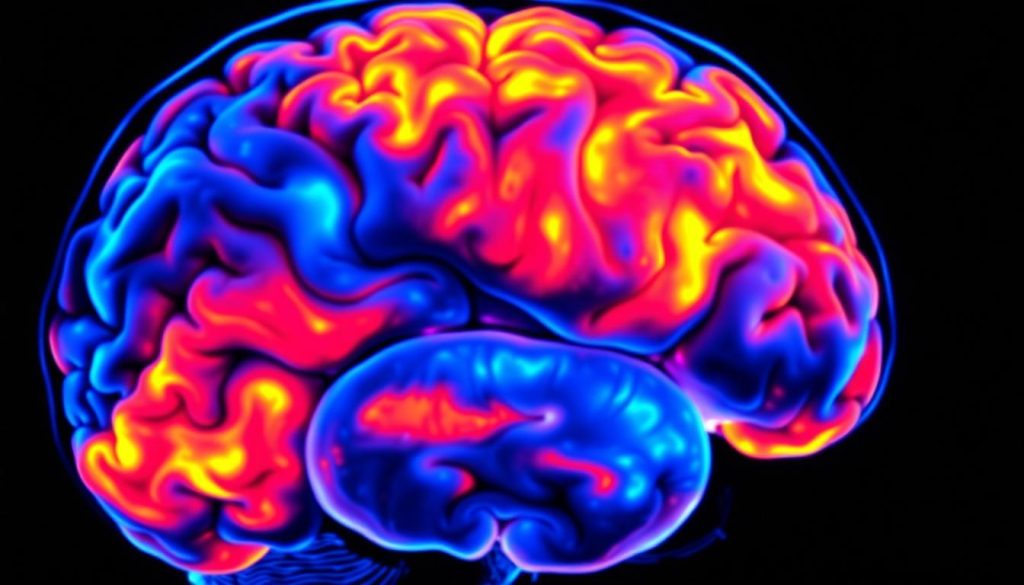
Alzheimer’s goes through different stages. These stages help in managing the disease better. The stages are:
- Mild (early-stage), where people can still do things on their own but might forget things.
- Moderate (middle-stage), where memory and thinking skills get worse, and people need help with daily tasks.
- Severe (late-stage), where people can’t respond to their surroundings or move on their own and need a lot of care.
Knowing these stages is important for planning care and treatment.
Studying Alzheimer’s helps us understand why it happens. It also shows the need for early detection and specific treatments. Medical research is making progress, offering hope for the future.
Clinical Symptoms of Dementia vs Alzheimer’s
Distinguishing between symptoms of dementia and symptoms of Alzheimer’s disease is key. Both share some signs but also have unique ones. This helps us understand each condition better.
The symptoms of dementia include memory loss, confusion, and trouble with speech. Alzheimer’s, a type of dementia, has similar symptoms. But it also has special signs like severe memory loss that affects daily life and gets worse over time.
| Symptom | Presence in Dementia | Presence in Alzheimer’s |
|---|---|---|
| Memory Loss | Common | More Severe |
| Difficulty with Complex Tasks | Common | Highly Pronounced |
| Changes in Behavior | Varies | Often Significant |
| Confusion with Time or Place | Usually Present | Almost Always Present |
| Problems Understanding Visual Images | Sometimes Present | Common |
| Speech Difficulties | Frequent | More Pronounced |
Understanding the difference between symptoms of dementia and symptoms of Alzheimer’s is crucial. It’s not just about the symptoms. It’s also about when they start and how they change. This knowledge helps doctors diagnose and treat patients better, supporting both patients and their families.
Exploring the Causes of Dementia
Diving into the causes of dementia helps us understand its complex nature. It shows how it develops over time, affecting different stages. Many factors contribute to its onset, from vascular issues to neurological diseases.
Vascular Contributions to Dementia
Vascular dementia is the second most common type. It happens when blood flow to the brain is impaired, causing cell damage. This can be due to narrowed or blocked blood vessels, leading to strokes or brain bleeding.
The link between vascular health and brain function is key. Managing heart and vascular health can help reduce the risk of this dementia type.
Other Dementia-Inducing Conditions
Several neurological conditions also play a big role in dementia. For example, Parkinson’s disease and Huntington’s disease significantly contribute to dementia stages. These diseases cause degenerative brain processes that harm cognitive and motor functions.
Other potential triggers include repeated head injuries, brain tumors, and certain infections like HIV. Each condition adds complexity to understanding dementia’s causes and progression.
- Studying heart health and its connection to cognitive decline
- Investigating genetic factors in Parkinson’s and Huntington’s diseases
- Monitoring the long-term effects of traumatic brain injuries
By addressing these underlying conditions, doctors can develop strategies to treat and possibly prevent some dementia types. Awareness and early intervention are crucial in managing dementia’s impact on individuals and their families.
Investigating the Causes of Alzheimer’s Disease
The search for what causes Alzheimer’s is complex. It involves genetics, the environment, and lifestyle. We explore how these factors lead to Alzheimer’s and dementia. This shows why we need more research and awareness.
Genetic markers are key in predicting risk. Research has found certain genes that increase the chance of getting Alzheimer’s. But, genetics isn’t the only factor. Environment and lifestyle also play big roles.
Things like toxins, head injuries, and social status are being studied. They might speed up or start Alzheimer’s. Also, what we eat, how active we are, and our mental activities can change our risk. This means we can take steps to possibly slow down or stop symptoms.
| Factor | Impact on Alzheimer’s Risk |
|---|---|
| Genetic Predisposition | Highly significant; certain genes increase risk considerably. |
| Environmental Exposures | Potential to accelerate disease onset; ongoing research. |
| Lifestyle Choices | Modifiable risk factors; diet and exercise show promise in risk reduction. |
Learning about the many causes of Alzheimer’s helps us fight the disease. It shows the need for a mix of genetic knowledge and lifestyle changes. New research gives us hope and ways to manage or prevent dementia.
Various Types of Dementia You Should Know
Exploring dementia is key to understanding its many forms. Alzheimer’s disease is well-known, but Lewy Body Dementia and Frontotemporal Dementia also impact many lives. Each type has its own symptoms and effects, making them different from Alzheimer’s.
Lewy Body Dementia
Lewy Body Dementia is marked by Lewy bodies in the brain. These abnormal proteins disrupt brain function. People with this type may see memory loss, hallucinations, and Parkinson-like symptoms. It can progress quickly, affecting quality of life greatly.
Frontotemporal Dementia
Frontotemporal Dementia mainly hits the frontal and temporal lobes. It causes changes in behavior and language. Memory might not be affected early on, but changes in personality and social behavior become clear.
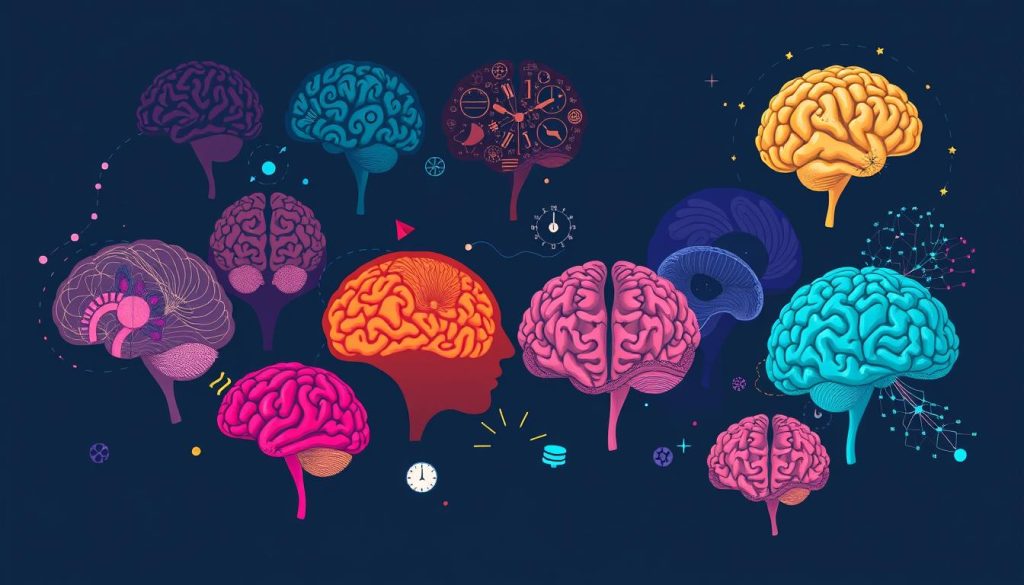
The table below shows the main differences between these dementia types and Alzheimer’s. It highlights key symptoms and how fast each type progresses.
| Type of Dementia | Key Symptoms | Rapid Progression? |
|---|---|---|
| Lewy Body Dementia | Cognitive fluctuations, hallucinations, motor symptoms | Yes |
| Frontotemporal Dementia | Changes in behavior and personality, language difficulties | No |
| Alzheimer’s Disease | Memory loss, disorientation, mood swings | Gradual |
Knowing about different dementia types and their symptoms helps patients and caregivers. It leads to better management and care strategies. Recognizing the specific type is crucial for timely and effective treatment.
What’s the Difference Between Dementia and Alzheimer’s Disease
Exploring the differences between dementia vs Alzheimer’s is key. Dementia is a term for many symptoms of cognitive decline. Alzheimer’s disease is a specific disorder within this category. We will look at what makes them different with examples and comparisons.
First, let’s talk about symptoms. What’s the difference between dementia and Alzheimer’s disease in symptoms? Both have memory loss and confusion. But, how these symptoms progress and affect people can be quite different.
| Symptoms | Dementia | Alzheimer’s Disease |
|---|---|---|
| Memory Loss | Typically mild | Often severe and worsening |
| Cognitive Functions | May affect multiple areas gradually | Starts with memory, progressively impairs reasoning |
| Behavioral Changes | Varies widely depending on type | More predictable, often includes confusion and aggression |
The causes of dementia vs Alzheimer’s also differ. Alzheimer’s is caused by brain plaques and tangles. This is not true for all dementia types. Knowing this is important for diagnosis and treatment.
Lastly, in answering what’s the difference between dementia and Alzheimer’s disease, it’s important to understand treatment. Alzheimer’s treatments aim to slow symptom progression. Dementia treatments vary based on the cause.
In summary, Alzheimer’s and other dementia types affect thinking. But, Alzheimer’s symptoms, causes, and treatments are unique. Knowing these differences helps in better care for those affected.
Comparing Dementia Stages to Alzheimer’s Stages
Understanding the progression in both dementia stages and Alzheimer’s stages is key. It helps in caring for patients and setting up support systems. This comparison is crucial for diagnosing and finding the right treatments.
Early, Middle, and Late-Stage Dementia
Dementia stages show a decline in cognitive and behavioral abilities. In the early stages, patients might forget recent events and feel confused. This gets worse in the middle stages, leading to big language problems and mood swings.
The late stage is when communication skills drop a lot. Patients may not recognize family or take care of themselves anymore.
Stages of Alzheimer’s Disease Progression
The Alzheimer’s stages also show a decline from mild to severe. Early stages include forgetting recent things and important details. This gets worse in the middle stages, causing big confusion and disorientation.
In the final stage, people can’t talk or respond to their surroundings. They need constant care.
| Stage | Dementia Symptoms | Alzheimer’s Symptoms |
|---|---|---|
| Early | Mild memory lapses, slight confusion | Forgetfulness, especially of recent events |
| Middle | Increased confusion, trouble with language and emotional control | Significant confusion, difficulty recognizing family and friends |
| Late | Severe memory loss, minimal physical capabilities | Loss of speech, unresponsiveness to environment |

Warning Signs: Symptoms of Dementia
Spotting the symptoms of dementia early is key for effective treatment. The signs can differ based on the types of dementia. Knowing these can guide the right care approach.
Common dementia signs include memory loss, trouble solving problems, and mood changes. While each symptom might not point to dementia alone, frequent occurrences can be a red flag.
- Memory loss that disrupts daily life
- Challenges in planning or solving simple problems
- Difficulty completing familiar tasks at home or at work
- Confusion with time or place
- Trouble understanding visual images and spatial relationships
- New problems with words in speaking or writing
- Misplacing things and losing the ability to retrace steps
- Decreased or poor judgment
- Withdrawal from work or social activities
- Changes in mood and personality
These symptoms of dementia can come from different types of dementia. Each type needs a specific care plan. Here’s a table showing symptoms for various dementia types.
| Type of Dementia | Common Symptoms | Characteristics |
|---|---|---|
| Alzheimer’s Disease | Memory loss, difficulty in making decisions | Progressive and affects cognition gradually |
| Vascular Dementia | Impaired judgment, step-wise decline in cognitive abilities | Often occurs after a stroke |
| Lewy Body Dementia | Visual hallucinations, sleep disturbances | Includes physical symptoms like tremors and slow movement |
| Frontotemporal Dementia | Personality changes, language difficulties | Affects the front and sides of the brain |
If you or someone you know shows several symptoms, see a doctor. Knowing the exact types of dementia helps in finding the right treatment.
Identifying Symptoms of Alzheimer’s Disease
Spotting the signs of Alzheimer’s disease is key to getting help early. This part talks about the mental and behavioral changes seen in the disease. It shows how these signs are connected to what causes Alzheimer’s.
Cognitive Symptoms Specific to Alzheimer’s
Alzheimer’s affects the mind in many ways, from small forgetfulness to big mental drops. The main signs include:
- Forgetting recent events or talks.
- Struggling with planning, solving problems, and doing familiar tasks.
- Getting confused about time or where you are, losing track of dates and seasons.
- Having trouble with spatial awareness and seeing things, making it hard to drive or read.
These mental problems are tied to the brain changes in Alzheimer’s. These changes include nerve damage and brain shrinkage over time.
Behavioral Changes in Alzheimer’s Patients
As Alzheimer’s gets worse, people may act differently. They might:
- Feel more anxious or agitated.
- Have sudden mood swings or feel sad.
- Start to pull away from work or family.
- Act out in ways they never did before, both in words and actions.
These changes in behavior show how Alzheimer’s affects the brain. It changes how people feel and how they interact with others.

| Cognitive Symptoms | Behavioral Changes |
|---|---|
| Memory lapses affecting daily activities | Agitation and mood swings |
| Difficulty handling complex tasks | Social withdrawal |
| Impairment in judgment | Changes in sleeping patterns or depression |
| Confusion over time or place | Verbal or physical outbursts |
Spotting these signs early helps caregivers and doctors plan better care. This can slow down the disease and lessen some symptoms linked to Alzheimer’s causes.
Diagnostic Approaches for Dementia
Understanding dementia and its differences from Alzheimer’s is key. A strong diagnostic framework is needed. This section explores the various methods used to diagnose dementia. It highlights the importance of medical history, physical exams, and neuropsychological tests.
Medical History and Physical Exams
Healthcare professionals start with a detailed medical history review. They discuss symptoms, past health issues, and family history of dementia or Alzheimer’s. They also look at medications that might affect thinking.
Physical exams are then done. They check neurological health and look for physical signs of dementia.
Neuropsychological Testing and Brain Imaging
Neuropsychological tests are crucial for diagnosing dementia. They check memory, problem-solving, and other thinking skills. Brain imaging like MRI and CT scans are also key.
These scans help find brain changes and other important signs. They help understand the dementia stages.
Using these tools together helps tailor care for dementia patients. It gives insights for effective care strategies.
How Alzheimer’s Disease is Diagnosed
Understanding how Alzheimer’s disease is diagnosed sheds light on its complexities. Doctors focus on catching early signs and symptoms. This helps in managing and slowing the disease’s progress.
The Role of Biomarkers in Alzheimer’s Diagnosis
Biomarkers play a key role in diagnosing Alzheimer’s. These markers in blood and cerebrospinal fluid reveal brain changes linked to the disease. The presence of beta-amyloid plaques and tau proteins is especially significant.
Research has made it possible to detect these markers before symptoms appear. This opens up opportunities for early interventions that could change the disease’s course.
Importance of Early Detection
Early detection of Alzheimer’s is crucial for patient care. Diagnosing the disease early allows for treatments that can ease symptoms and improve life quality. It also helps families and caregivers plan for the future.
So, understanding Alzheimer’s causes and spotting signs early is key.
| Biomarker | Description | Importance in Diagnosis |
|---|---|---|
| Beta-Amyloid | Protein fragments that accumulate into plaques | Key indicator of Alzheimer’s early in disease stages |
| Tau Proteins | Abnormal deposition of tau proteins into tangles | Significant for confirming diagnosis post initial indicators |
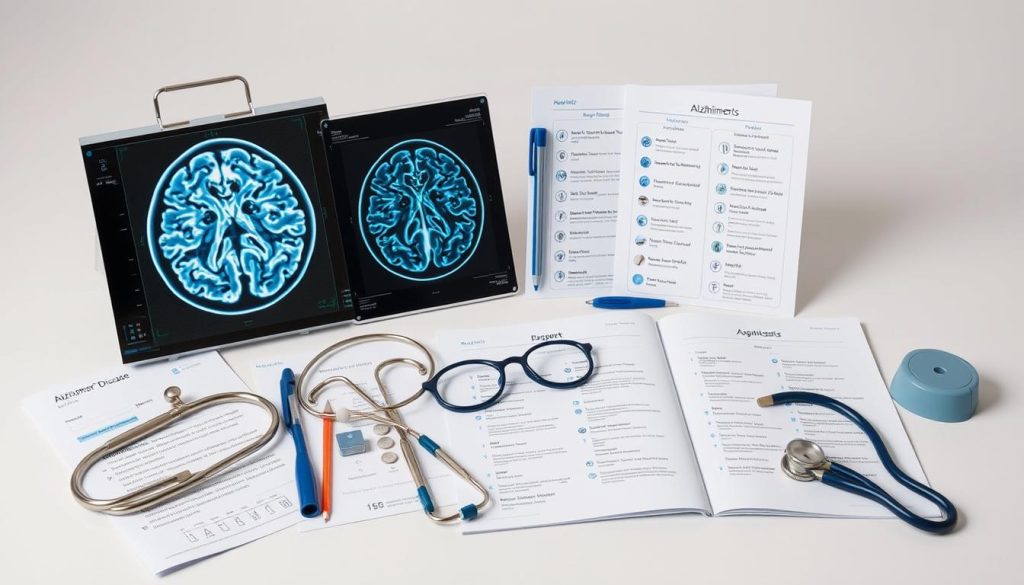
Treatment Options for Dementia
Treating types of dementia needs a mix of medical care, support, and lifestyle changes. This helps manage symptoms of dementia. Knowing all the treatment options can improve life quality for those affected.
Medications and Therapies for Dementia
Many FDA-approved medicines help manage dementia symptoms. They aim to boost thinking skills, control behavior, and slow symptom growth. Therapies like cognitive behavioral therapy and occupational therapy also help with daily tasks and thinking.
Supportive Care and Lifestyle Adjustments
Supportive care is key, covering nutrition to exercise tailored to each person. Making lifestyle changes, like a safe home and daily routines, is also vital. These steps help manage dementia well.
A holistic approach to dementia care is crucial. It meets both physical and mental needs. This offers a better way to manage all types of dementia.
| Medication Type | Purpose | Common Medications |
|---|---|---|
| Cholinesterase Inhibitors | Slow progression of symptoms | Donepezil, Rivastigmine |
| Antipsychotics | Control behavioral issues | Risperidone, Olanzapine |
| Antidepressants | Manage depression | Sertraline, Citalopram |
The main goal is to improve life quality with dignity and respect. Focus on the person’s strengths and abilities, not just their limitations.
Managing Alzheimer’s Disease: Therapies and Support
Dealing with Alzheimer’s disease requires a mix of medicines and non-medical treatments. As people go through different stages of Alzheimer’s, it’s important to have personalized care plans. Strong support from caregivers is also key.
Pharmacological Treatments for Alzheimer’s
Medicines are a big part of treating Alzheimer’s. They aim to slow down the disease’s symptoms and improve life quality. These drugs try to balance brain chemicals to help the brain work better.
- Cholinesterase inhibitors (e.g., Donepezil, Rivastigmine) are given in early to moderate stages. They help nerve cells talk to each other.
- NMDA receptor antagonists (e.g., Memantine) are for moderate to severe cases. They control glutamate levels to protect brain cells.
Non-Drug Approaches and Caregiver Support
Non-medical strategies are also vital in managing Alzheimer’s. They help with daily tasks and mental health.
- Cognitive therapies include activities to improve brain function.
- Social programs help people feel less alone by encouraging interaction.
- Exercise plans, tailored to each person, keep them mobile and coordinated.
Caregivers are crucial in managing Alzheimer’s. Giving them resources and education about the disease helps them a lot.
Understanding Alzheimer’s progression and its symptoms is important. A mix of medicines, caregiver support, and non-medical practices is the best way to manage the disease.
Conclusion
Understanding the difference between dementia and Alzheimer’s disease is key. Dementia is a broad term for many brain conditions that make memory and thinking skills worse. Alzheimer’s is a major type of dementia, known for its unique brain changes.
We’ve looked at the symptoms, stages, and how doctors diagnose these conditions. Our goal is to help and show empathy to those dealing with these diseases. We aim to mix expert knowledge with caring support.
As we end this part of your journey, remember how important awareness and early detection are. While we still search for causes and cures, knowing the differences helps us care better. Let this knowledge guide us towards hope and strength for those with Alzheimer’s and dementia.
FAQ
Q: What’s the difference between dementia and Alzheimer’s disease?
A: Dementia is a term for many brain conditions that cause memory loss and thinking problems. Alzheimer’s disease is the most common cause of dementia. It’s a brain disorder that slowly destroys memory and thinking skills.
Q: Are dementia symptoms consistent across all types?
A: No, dementia symptoms can be similar but vary by type. Each type, like Alzheimer’s, vascular dementia, and Lewy body dementia, has its own symptoms and progression.
Q: What are the causes of Alzheimer’s disease?
A: The causes of Alzheimer’s are not fully known. They likely include genetics, environment, and lifestyle. Brain changes in Alzheimer’s include amyloid plaques and tau tangles, leading to neuron loss.
Q: Can dementia be caused by non-degenerative conditions?
A: Yes, dementia can be caused by non-degenerative conditions. For example, vascular dementia is caused by blood vessel problems. Knowing the cause is important because some dementias can be treated or reversed.
Q: How does Alzheimer’s stage progression differ from other dementia stages?
A: Alzheimer’s progresses through three stages. The early stage has mild symptoms like forgetfulness. The middle stage has more memory loss and confusion. The late stage has significant daily activity and communication problems. Other dementias may progress differently.
Q: What kind of cognitive changes might suggest Alzheimer’s disease?
A: Cognitive symptoms of Alzheimer’s include memory loss that affects daily life. It also includes problem-solving challenges, difficulty with familiar tasks, confusion with time or place, and trouble understanding visual images.
Q: How are dementia and Alzheimer’s diagnosed?
A: Dementia and Alzheimer’s are diagnosed with medical history, physical exams, and brain imaging. Alzheimer’s diagnosis may also use biomarkers and PET scans. Early detection is key for both conditions.
Q: What are the treatment options for dementia?
A: Treatments for dementia include FDA-approved medications and cognitive therapies. Lifestyle changes are also important. The goal is to manage symptoms, maintain mental function, and slow progression. Supportive care is crucial for quality of life.
Q: Are there specific therapies for Alzheimer’s disease?
A: Yes, Alzheimer’s treatments may include medications to improve symptoms or slow progression. Non-drug approaches include cognitive therapy and activities. Caregiving support is vital in managing the disease.
Q: What are some non-medical ways to support a person with dementia or Alzheimer’s?
A: Supporting someone with dementia or Alzheimer’s includes creating a safe environment and establishing a routine. Social interaction and activities that stimulate cognition and memory are important. Nutritional support, physical exercise, and emotional support are also crucial for both the individual and caregivers.













